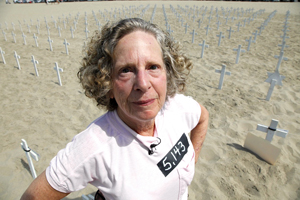Military mental health
Judith Broder, SB’60, MD’63, treats soldiers after they return from the field.
By Justine Garrett
Photography by Dan Dry

Thousands of soldiers have been killed in Iraq and Afghanistan; Broder helps those who return.
Two comfortable chairs and a therapist’s couch. “My practice literally was this,” says Judith Broder, SB’60, MD’63, of her home office. In 2004 she was ready to retire from psychoanalyzing clients in Studio City, California. Her husband, Donald Broder, SB’58, MD’62, who served during Vietnam as a military psychiatrist, had recently retired. “We were going to just have an easy life and travel and hang out.”
But then she saw The Sand Storm: Stories from the Front, a play written by an Iraq War veteran. “It was extremely powerful for me,” says Broder, who found herself disturbed by the feelings that Marines expressed about themselves after combat. War “affected their whole sense of themselves as good people,” she says. “They had to do things that go against the way we are all brought up: to not kill, to love your neighbors, to be kind to strangers. And if you want to survive a war, you can’t do those things—maybe even more this war than others.”
Around the same time, Broder visited Arlington West—a memorial erected each Sunday on the beach in Santa Monica, California. “The play was about specific intimate details of the ones who survived,” Broder says, while the memorial was about those who died. Volunteers place crosses or other markers in the sand to represent all American military personnel killed in Iraq and Afghanistan, a figure that totals in the thousands.
Less quantifiable casualties are the vets who survive and come home with what Broder calls “the invisible wounds of war.” So in 2004 she formed the Soldiers Project, initially an extension of the counseling she did for the Los Angeles Institute and Society for Psychoanalytic Studies. There she volunteered with community-based projects, working with teenage mothers and their infants, for instance, through the organization’s trauma center. When she proposed the group expand to include counseling for veterans and their families, her colleagues responded enthusiastically, and the Soldiers Project was born.
The program provides free, confidential psychotherapy to Iraq and Afghanistan veterans and their families. Since 2005 it has grown from ten volunteer mental-health professionals in Los Angeles to more than 400 in cities nationwide. Broder’s volunteers have served more than 400 veterans and families in Southern California alone, many for up to two years, though there is no limit on how long they can stay in therapy.
A lot of veterans and their families don’t qualify for counseling services offered by the U.S. Department of Veterans Affairs and Vet Centers, Broder says, including gay and lesbian couples and unmarried partners of vets. Other former soldiers, traumatized or angered by their war experiences, choose to steer clear of the VA’s bureaucracy. In addition to serving these groups, her project also connects willing vets with available VA services.
Before therapists can volunteer with the Soldiers Project, they undergo training about military culture and combat stress, as well as seminars about postwar physical and psychological issues, such as traumatic brain injury. “I knew how emotionally distraught I had been” after seeing The Sand Storm, Broder says. In war, “you never know if a woman in a burka is pregnant or has bombs attached to her.” Sometimes soldiers make the wrong choice, and the resulting angst can lead them to make bad decisions postwar, such as drug abuse or domestic violence.
The consequences affect not only those in the military but also the people around them. Civilians seldom think about vets with PTSD, says Broder, so the Soldiers Project also aims to educate the public. “If it’s not affecting you at this moment,” she says, “it’s going to affect you when there are more people in jail, when there are more auto accidents, when there are more disrupted families and kids who drop out of school.” These forms of acting out are “normal responses to abnormal situations.”
This past October the Soldiers Project earned Broder a 2009 Purpose Prize, awarded by Bay Area think tank Civic Ventures, which annually honors ten baby boomers in second careers addressing social problems. The $100,000 award will go toward gathering and analyzing data about the program and establishing additional locations. With an all-volunteer organization and limited funding, it’s been hard to keep track of sites outside Los Angeles. “Come back next year” to get some better numbers about the project’s impact, Broder jokes. “Now I have some money to hire someone.”
WRITE THE EDITOR
E-MAIL THIS ARTICLE
SHARE THIS ARTICLE
RELATED READING
“Judith Broder's Encore Career: Psychological Support for Returning Soldiers” (Idealist.org, November 13, 2009)
“Soldiers Project Aims to Heal War's Mental Scars” (NPR, Weekend Edition, November 14, 2009)
“Soldiers Project Helps Vets Cope with War's Mental Scars" (Los Angeles Times, November 28, 2009)
